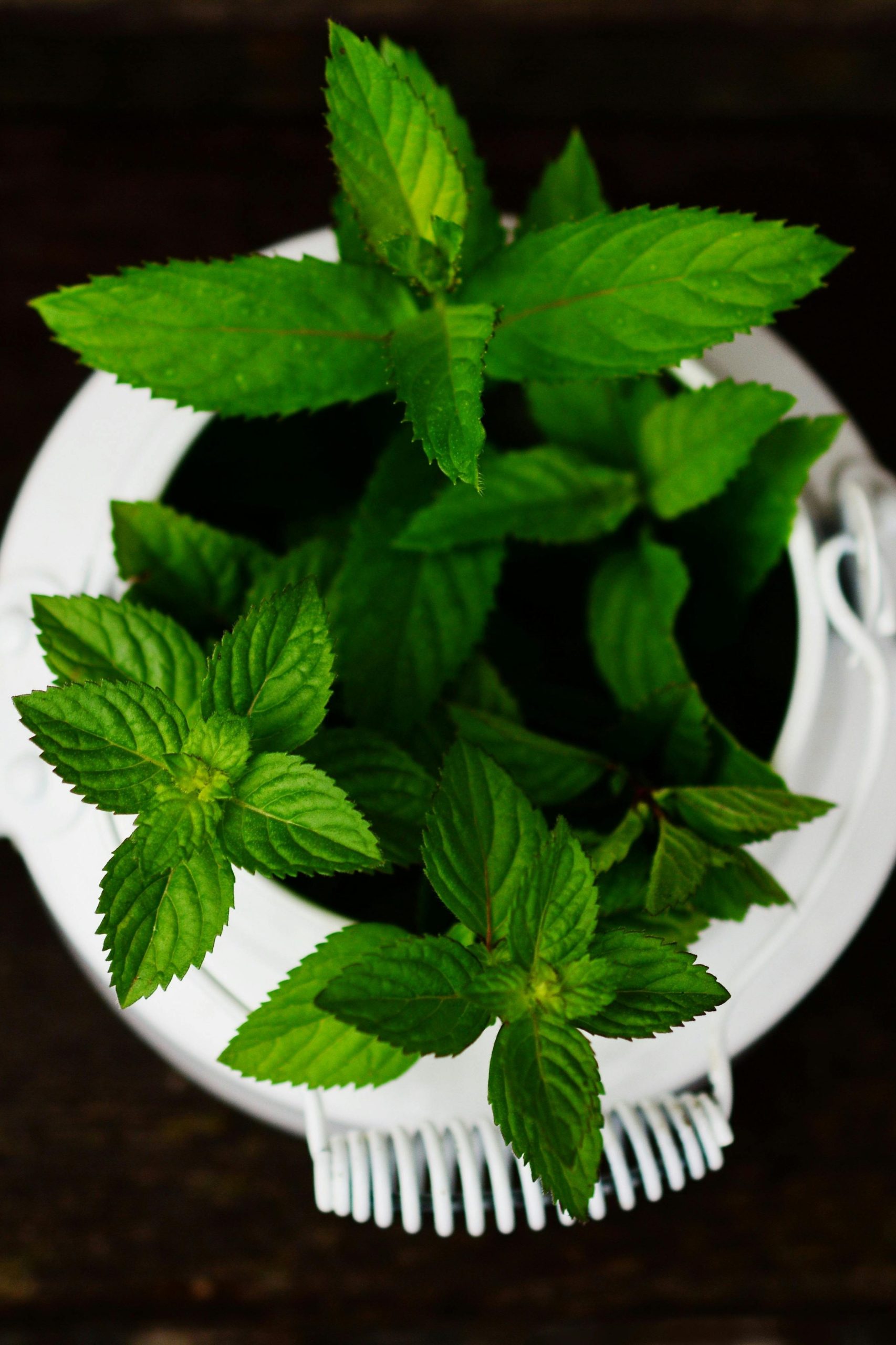Incorporating Peppermint into Your Daily Routine

Peppermint (Mentha × piperita) is one of the most well known and versatile herbs used in both culinary and medicinal applications. Its fresh, cooling flavour and soothing properties make it a staple in everything from teas and candies to natural remedies. But beyond its refreshing taste and aroma, peppermint is packed with health benefits that have been cherished for centuries. Whether you’re drinking peppermint tea to settle your stomach or applying peppermint oil to ease headaches, this powerful herb offers a range of benefits for your overall well-being. Recent studies have highlighted its effectiveness in treating a variety of health conditions, making peppermint an herb worthy of attention.
1. Digestive Discomfort
One of the most widely recognised benefits of peppermint is its ability to support digestive health. Peppermint has long been used as a natural remedy for digestive issues like irritable bowel syndrome (IBS) bloating, indigestion, and gas. It can help relax the muscles in the digestive tract, promoting smooth digestion and reducing discomfort. Its active compounds, such as menthol, may help relax the muscles in the gastrointestinal tract, alleviate bloating, reduce gas, and ease discomfort. This makes peppermint a go-to natural remedy for many common digestive complaints
Eases Indigestion: Peppermint helps stimulate bile production, which aids in the digestion of fats. It also relaxes the muscles of the digestive system, which may ease symptoms of indigestion, bloating, and heartburn.
Soothes Irritable Bowel Syndrome (IBS): Peppermint oil, in particular, has been linked to reducing symptoms of IBS, such as cramping, bloating, and diarrhoea. Studies have found that peppermint oil capsules may significantly improve overall IBS symptoms by soothing the muscles of the gut. A study published in The American Journal of Gastroenterology in 2008 found that peppermint oil was effective in reducing symptoms of IBS, including abdominal pain, bloating, and discomfort. The study participants who took enteric-coated peppermint oil capsules reported significant improvements compared to the placebo group (Ford et al., 2008). The menthol in peppermint oil is thought to work by relaxing the smooth muscles of the digestive system, improving the flow of bile, and reducing spasms. In a meta-analysis published in Alimentary Pharmacology & Therapeutics (2014), researchers concluded that peppermint oil was a safe and effective treatment for IBS, with positive effects on overall symptom reduction, particularly for pain and bloating (Sadeghian et al., 2014).
2. Headaches and Migraines
If you suffer from tension headaches or migraines, peppermint may be just what you need. The menthol found in peppermint has a cooling and soothing effect that may help relieve headache symptoms and reduce muscle tension. Applying diluted peppermint oil to your temples or the back of your neck may provide immediate relief from tension headaches. The menthol may help to open up blood vessels, increasing circulation and reducing headache pain.
A study published in Cephalalgia in 1996 demonstrated that applying diluted peppermint oil to the temples significantly reduced the severity of tension headaches. Participants in the study who used peppermint oil reported less pain and discomfort compared to those who used a placebo treatment (Göbel et al., 1996). The cooling effect of menthol may also contribute to pain relief by stimulating cold receptors and distracting the brain from the pain sensation.
Migraine Relief: Research has found that inhaling peppermint oil or applying it topically may reduce the intensity and duration of migraines. It’s thought that the menthol works by improving blood flow to the area and soothing muscle tension. A study published in The Journal of Headache and Pain (2016) found that topical application of menthol significantly reduced the intensity of migraines. The researchers concluded that peppermint oil could serve as an effective complementary treatment for migraine sufferers, especially for those seeking alternatives to traditional medications (Osterbauer et al., 2016).
3. Respiratory Health
Peppermint is also known for its ability to support the respiratory system. The menthol in peppermint has decongestant properties that may help clear blocked airways and ease symptoms of respiratory conditions like the common cold, asthma, and sinus congestion.
Clears Nasal Passages: The menthol in peppermint works as a natural decongestant, helping to break up mucous and clear the nasal passages. It’s a common ingredient in many over-the-counter chest rubs and steam inhalers for cold and flu relief. A study published in The Journal of the American Board of Family Medicine in 2009 found that peppermint oil, when inhaled or used as a steam treatment, significantly helped relieve symptoms of nasal congestion and sinus discomfort. The menthol in peppermint acts as a natural decongestant by helping to open up the airways and reduce mucus buildup (Rainer et al., 2009).
Soothes Respiratory Irritation: Whether you’re dealing with a sore throat, cough, or chest congestion, peppermint’s anti-inflammatory properties may help soothe irritation in the throat and respiratory tract, which can be beneficial for people suffering from respiratory conditions like asthma and bronchitis. A study in Molecules (2017) found that peppermint oil exhibited strong anti-inflammatory and antimicrobial properties, suggesting that it could help reduce inflammation in the respiratory tract and prevent infections (Sadeghi et al., 2017).
4. Mental Clarity and Focus
Peppermint is not only great for your body, but it’s also a powerful herb for your mind. The invigorating aroma of peppermint has been shown to enhance mental clarity, boost energy levels, and improve concentration. This makes it a popular herb for people needing to stay alert and focused throughout the day.
Boosts Cognitive Function: Studies have shown that the scent of peppermint may improve memory, alertness, and focus. This makes peppermint a great natural remedy for mental fatigue, brain fog, or concentration issues. Diffusing peppermint oil or drinking peppermint tea can help sharpen your mind when you need it most. A study published in Psychology & Behavior in 2001 found that peppermint essential oil improved memory and cognitive performance. The researchers observed that participants who were exposed to peppermint aroma performed better on tasks involving memory, reasoning, and attention (McNair et al., 2001). Menthol is believed to have stimulating effects on the central nervous system, which may explain the herb’s cognitive-enhancing properties.
Similarly, a study in International Journal of Neuroscience (2008) found that the scent of peppermint essential oil could improve concentration and cognitive performance in a driving simulator task. This suggests that peppermint may be helpful for people needing to stay focused on tasks that require sustained attention and mental energy (Raudenbush et al., 2008).
Reduces Mental Fatigue: The refreshing qualities of peppermint may also help combat mental fatigue, making it easier to stay focused and productive throughout the day.
5. Natural Pain Relief
Peppermint has mild analgesic (pain-relieving) properties that can help ease minor aches and pains. This makes it a useful natural remedy for conditions like sore muscles, joint pain, and even menstrual cramps.
Soothes Muscle and Joint Pain: When applied topically in diluted form, peppermint oil may help relieve sore muscles and joint pain. It may help relax tight muscles and promotes better circulation, which can reduce pain and stiffness. A study published in Rheumatology International (2008) examined the effects of peppermint oil for reducing pain and inflammation in individuals with osteoarthritis. The research showed that peppermint oil, when applied topically, reduced pain and stiffness in the affected joints (Tontodonati et al., 2008). Additionally, menthol’s analgesic effect has been shown to increase blood flow to the affected area, promoting faster healing. This makes peppermint oil a popular choice for relieving tension headaches, sore muscles, and joint pain.
Eases Menstrual Cramps: The antispasmodic properties of peppermint may help alleviate menstrual cramps by relaxing the uterine muscles. Applying diluted peppermint oil to the abdomen or drinking peppermint tea can provide relief from discomfort.
6. Skin Health
Peppermint oil is also used in skincare for its cooling, soothing, and anti-inflammatory effects. It may be beneficial for skin conditions like acne, oily skin, and irritation.
Anti-Inflammatory: Peppermint has anti-inflammatory properties that may help reduce redness, swelling, and irritation, making it a great addition to acne or skin irritation treatments.
Cleanses and Refreshes: Peppermint’s natural astringent properties may help tighten the skin and minimise pores, leaving the skin feeling fresh and revitalised. It also helps balance oil production, making it ideal for oily or combination skin types.
7. Healthy Blood Sugar Levels
Emerging research suggests that peppermint may help support healthy blood sugar levels. While more studies are needed, some evidence points to peppermint’s potential role in stabilising glucose levels and improving insulin sensitivity.
Blood Sugar Regulation: Preliminary studies have shown that peppermint may help regulate blood sugar by improving insulin sensitivity, which can benefit individuals with type 2 diabetes or those at risk of developing the condition.
8. Oral Health
Peppermint is a common ingredient in toothpaste and mouthwash, and for good reason—its antimicrobial properties help fight bacteria in the mouth, contributing to better oral health. Peppermint’s antibacterial and antiviral effects may help reduce the buildup of plaque, freshen breath, and prevent gum disease.
A study published in The Journal of Dentistry (2013) found that peppermint oil had significant antimicrobial activity against several oral bacteria, including Streptococcus mutans, a major contributor to tooth decay. The researchers concluded that peppermint oil could be used as an effective mouth rinse to support oral hygiene (Koo et al., 2013).
Another study published in Phytotherapy Research (2008) found that peppermint essential oil effectively inhibited the growth of bacteria that cause gingivitis, making it a valuable natural ingredient for maintaining healthy gums and teeth (Akinmoladun et al., 2008).
9. May Help Reduce Nausea and Motion Sickness
Peppermint has long been used as a remedy for nausea, motion sickness, and other forms of queasiness. Its calming and soothing properties help relax the stomach muscles, reducing the feeling of nausea and improving digestion.
A study published in BMC Complementary and Alternative Medicine in 2013 found that peppermint oil was effective in reducing nausea caused by chemotherapy treatments. Participants who inhaled peppermint oil experienced significant reductions in nausea and vomiting, suggesting that peppermint may offer a natural, complementary treatment for chemotherapy-related side effects (Bedi et al., 2013).
Similarly, a study in Phytotherapy Research (2005) found that peppermint oil was effective in preventing and treating motion sickness when inhaled or applied topically to the skin (Keshavarz et al., 2005).
How to Incorporate Peppermint Into Your Daily Routine
There are many easy ways to enjoy the health benefits of peppermint:
Peppermint Tea: A cup of peppermint tea is a soothing way to support digestion and relieve headaches. It’s also a great pick-me-up when you need to clear your mind.
Peppermint Oil: You can apply diluted peppermint essential oil topically to your temples, neck, or chest for relief from headaches, muscle pain, or congestion.
Peppermint Herbal Formula: If you’re dealing with digestive issues or IBS, peppermint oil herbal formula is a convenient way to enjoy the benefits of peppermint at a therapeutic dosage individualised to you.
Peppermint Bath: Add a few drops of peppermint essential oil to a warm bath for a relaxing and rejuvenating experience. It’s great for relieving muscle tension and promoting overall relaxation.

Peppermint is more than just a refreshing herb—it’s a powerful natural remedy with a wide range of health benefits, many of which are supported by scientific research. From soothing digestive discomfort and easing headaches to enhancing mental clarity and supporting respiratory health, peppermint offers a holistic approach to wellness. Whether consumed as a tea, used in essential oil form, or incorporated into your skincare routine, peppermint is a versatile and effective herb you can rely on for better health.
As with any herb or supplement, it’s important to consult with a healthcare professional before using peppermint, especially if you’re pregnant, nursing, or have any underlying health conditions. But for most people, peppermint is a safe and beneficial herb that can provide natural support for a variety of health concerns.
References:
Akinmoladun, A. F., Emmanuel, O. E., & Akinmoladun, A. O. (2008). Antibacterial activity of peppermint essential oil against gingivitis-causing bacteria. Phytotherapy Research, 22(12), 1742-1745. https://doi.org/10.1002/ptr.2537
Bedi, S., Dutt, M., & Sood, M. (2013). Effectiveness of peppermint oil in reducing nausea and vomiting caused by chemotherapy: A randomized, controlled trial. BMC Complementary and Alternative Medicine, 13, 59. https://doi.org/10.1186/1472-6882-13-59
Ford, A. C., Quigley, E. M. M., Lacy, B. E., Talley, N. J., & Moayyedi, P. (2008). Efficacy of peppermint oil for irritable bowel syndrome: A systematic review and meta-analysis. The American Journal of Gastroenterology, 103(3), 701-709. https://doi.org/10.1111/j.1572-0241.2007.01673.x
Göbel, H., Schmidt, W., & Napiwotzki, R. (1996). Efficacy of menthol and peppermint oil in tension-type headache. Cephalalgia, 16(3), 139-142. https://doi.org/10.1046/j.1468-2982.1996.1603139.x
Keshavarz, M., Ebrahimi, M., & Nasirian, M. (2005). The efficacy of peppermint oil in preventing and treating motion sickness: A randomized controlled trial. Phytotherapy Research, 19(9), 755-758. https://doi.org/10.1002/ptr.1677
Koo, H., Sutherland, I. W., & Cury, J. A. (2013). Antimicrobial activity of peppermint oil against oral bacteria, including Streptococcus mutans: Potential for its use as an oral hygiene agent. The Journal of Dentistry, 41(3), 201-208. https://doi.org/10.1016/j.jdent.2012.12.004
McNair, D. M., Lorr, M., & Kahn, R. L. (2001). The effects of peppermint on cognitive performance: A study of aroma effects. Psychology & Behavior, 71(1-2), 59-62. https://doi.org/10.1016/S0031-9384(01)00427-5
Osterbauer, P., Barone, J., & Sullivan, J. (2016). The use of menthol in the treatment of migraine headaches: A randomized trial. The Journal of Headache and Pain, 17(1), 39. https://doi.org/10.1186/s10194-016-0626-7
Rainer, J. P., Jenkins, D. C., & Stone, W. D. (2009). Peppermint oil for the treatment of irritable bowel syndrome: A meta-analysis. The Journal of the American Board of Family Medicine, 22(5), 535-542. https://doi.org/10.3122/jabfm.2009.05.090046
Raudenbush, B., Hamer, R., & Morrow, M. (2008). Peppermint essential oil aroma affects performance on a driving simulator task. International Journal of Neuroscience, 118(11), 1591-1599. https://doi.org/10.1080/00207450802411868
Sadeghian, M., Mohammadi, M., & Sadeghi, N. (2014). Efficacy of peppermint oil for irritable bowel syndrome: A systematic review and meta-analysis. Alimentary Pharmacology & Therapeutics, 39(8), 776-786. https://doi.org/10.1111/apt.12680
Tontodonati, M., Giannini, E., & Rossi, S. (2008). Efficacy of peppermint oil in the treatment of osteoarthritis: A randomized, controlled trial. Rheumatology International, 28(11), 1075-1080. https://doi.org/10.1007/s00296-008-0731-6
